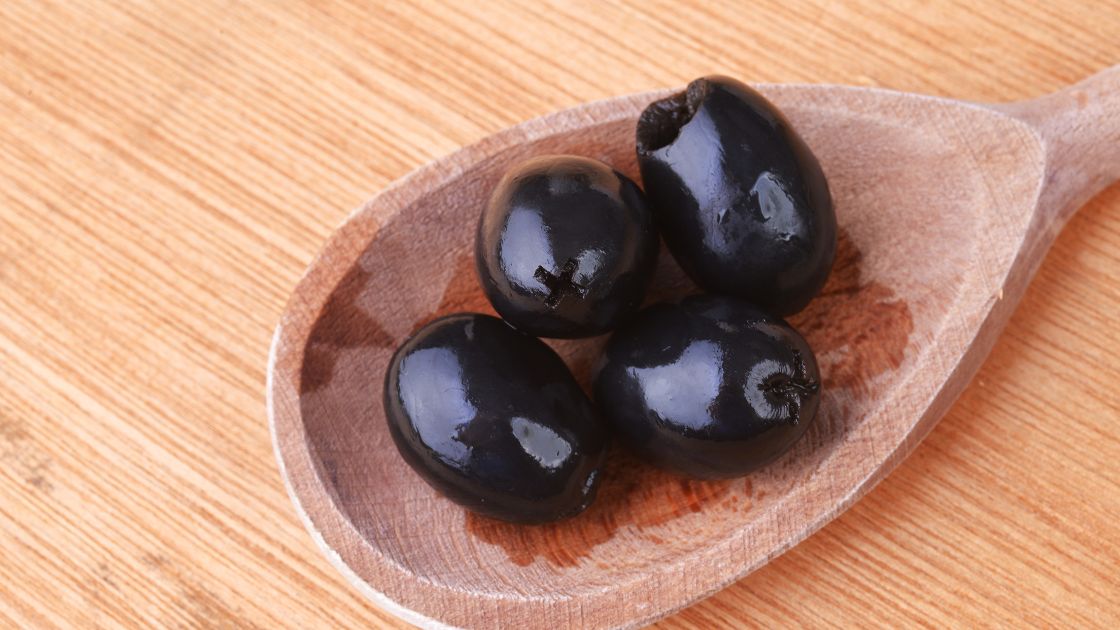Did you know that black olives are more than a cooking ingredient?
This fruit from the olive tree has many benefits to offer. Its characteristic flavor not only adds a special touch to dishes but also adds nutrients.
Read on and discover the nutritional value of black olives and their enormous health benefits.
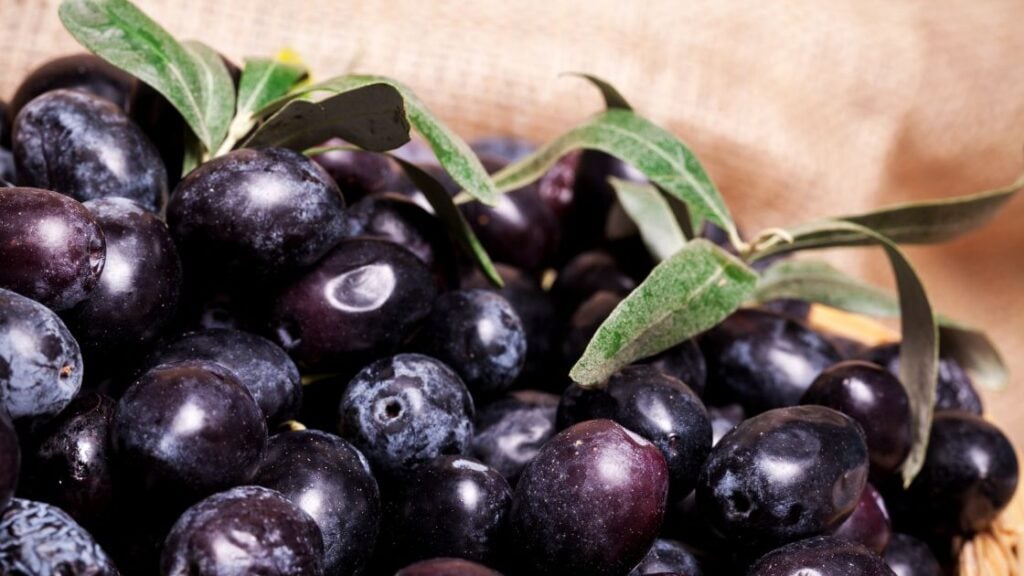
Physical description
The fruit of the olive tree is a member of the Oleaceae family of plants.
It is small in size and oval in shape. The olive has delicate green skin that turns purple, scarlet, and finally black as it ripens.
When the fruit is fully ripe, the black olives are harvested.
That is why in the market there are 2 types of olives: green and black. Stuffed olives are those that do not have a pit and any type of filling has been placed on them.
That is why John Marsden is right to say:
“Name three types of olives. Olives! I wouldn’t know one type! Well, there are three. You can get green ones, you can get black ones, or you can get stuffed.”
The whole fruit, whether pitted or filled, is used in cooking as a seasoning or ingredient in foods. With the fleshy pulp that surrounds its fusiform bone, olive oil is prepared.
Its origin and production are quite particular, know a little about it.
History and production
The olive was initially used to extract oil for ritual, cosmetic, and lighting uses. But there are references from the first century AD that describe the direct ingestion of the fruit.
Well-known writings of the famous Columela from Cádiz included various preparation techniques. These include brining, seasoning with fennel, and adding vinegar, and mastic leaves. That was quite a breakthrough in the kitchen.
The history of the olive tree dates back thousands of years. That is why Lawrence Durrell said:
“The whole Mediterranean… the wine, the ideas… seems to ride in the sour pungent taste of those black olives… A taste older than meat, older than wine. A taste as old as cold water.”
This tree has a long history and was widely cultivated in the Mediterranean region, including Europe, Africa, and Asia Minor. The Spanish invaders were responsible for the expansion of its cultivation to America in the 16th century.
At the end of the 19th century, Seville saw the start of the industrial-scale production of “vegetables a la española”. These were the first table olives from Spain. Spain has dominated world markets ever since, both in terms of production and sales volume.
Its production was favored thanks to the nutrients and benefits that this fruit can provide.
Do you want to know what they are?
Learn a little more about them.
Nutrients of Olives black
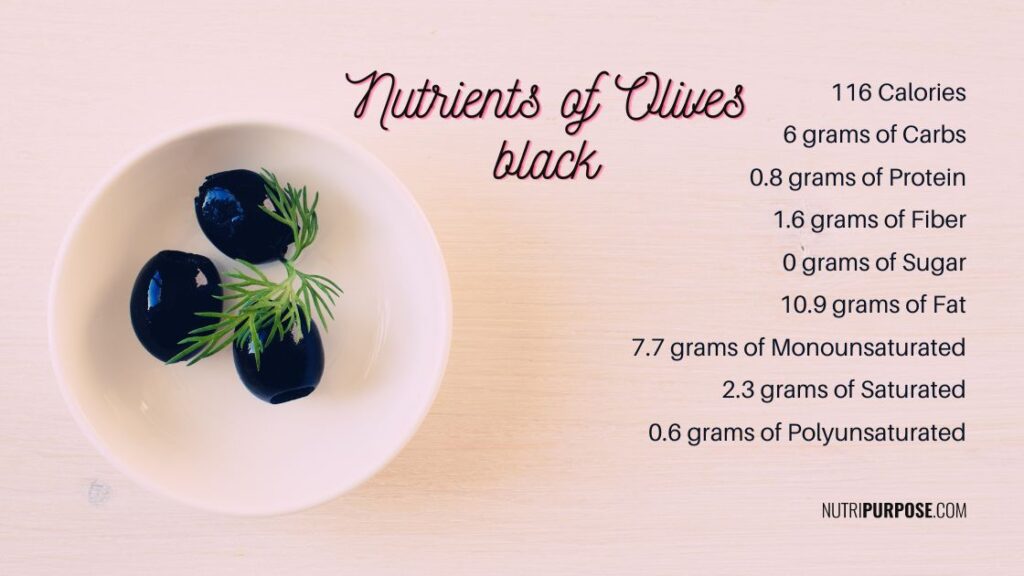
The nutrient information for 3.5 ounces (100 grams) of canned, ripe olives is:
- 116 Calories
- 6 grams of Carbs
- 0.8 grams of Protein
- 1.6 grams of Fiber
- 0 grams of Sugar
- 10.9 grams of Fat
- 7.7 grams of Monounsaturated
- 2.3 grams of Saturated
- 0.6 grams of Polyunsaturated
Olives black health benefits
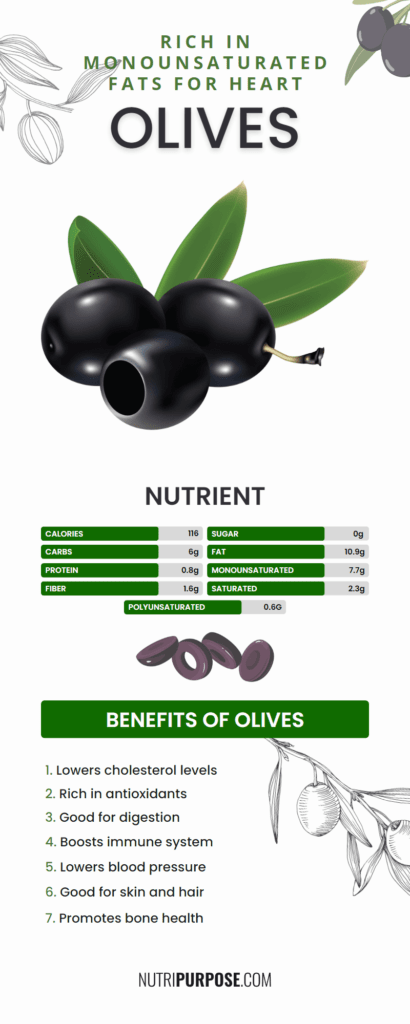
Copy this code and paste it on your website:
<a href="https://nutripurpose.com/olives-black/"><img style="width:100%;" src="https://nutripurpose.com/wp-content/uploads/2023/02/Olives.png"></a><br>Read More <a href="https://nutripurpose.com/olives-black/">Olives</a>Better heart health
Risk factors for heart disease include high blood pressure and high blood cholesterol.
The main fatty acid in olives, oleic acid, has been linked to better heart health. In addition, it can control cholesterol levels and prevent LDL (bad) cholesterol from oxidizing.
Olives and olive oil can also lower blood pressure, according to some research.
Antioxidant qualities
Antioxidants in the diet have been found to reduce the likelihood of developing chronic disease. Some diseases that can be prevented are cancer and heart disease.
Black olives are a good source of antioxidants. They provide a variety of health benefits, including the ability to reduce the growth of microorganisms and fight inflammation.
Glutathione is one of the most powerful antioxidants required by our bodies. Studies found that consuming the pulpy residue of the olive significantly can raise blood levels of this antioxidant.
If you want to get more antioxidants naturally, you can also include mangoes, kiwis, spinach, broccoli, and bananas in your diet.
Strengthened bone health
Bone quality and bone mass are decreased in people with osteoporosis. The lower the bone mass, the greater the probability of fractures.
The Mediterranean nations have a lower incidence of osteoporosis than the rest of Europe. This has suggested that olives may help prevent this disease. This is concluded because, in the Mediterranean nations, the consumption of olives is high.

In animal and test-tube tests, certain plant components included in olives and olive oil have been shown to help prevent bone loss.
Observational studies also indicate that eating a Mediterranean-style diet may reduce the incidence of bone fractures.
Prevention of cancer
In the Mediterranean region, the fairly frequent consumption of olives and olive oil is practiced. In this region, the incidence of cancer and other chronic diseases is lower than in other Western countries.
Many specialists comment that this low incidence is possibly due to the consumption of olives and olive oil. For this reason, there is a claim that olives can help reduce the risk of developing cancer.
This can be partly attributed to the high levels of antioxidants and oleic acid present in olives. The life cycle of breast, colon, and stomach cancer cells is disrupted by these substances. This is demonstrated in experiments carried out in test tubes and under observation.
So eating olives or using olive oil can reduce the risk of developing cancer. However, to validate these findings, long-term controlled human research is required.
Since you know the nutrients and benefits, you surely want to start introducing them into your meals. Here are some ideas for you to start whenever you want.
Olives black recipes
Cream of Black Olive
Preparation time: 10 minutes
Surrender for: 8 servings
Ingredients
- 2 garlic cloves finely chopped
- 4 tablespoons grated parmesan cheese
- 3 teaspoons of extra virgin olive oil
- 15 ounces of black olives
Procedure
- Combine olives, garlic, and parmesan cheese in a food processor.
- While processing, carefully add the olive oil. Continue processing for about 30 seconds.
Fried Black Olives
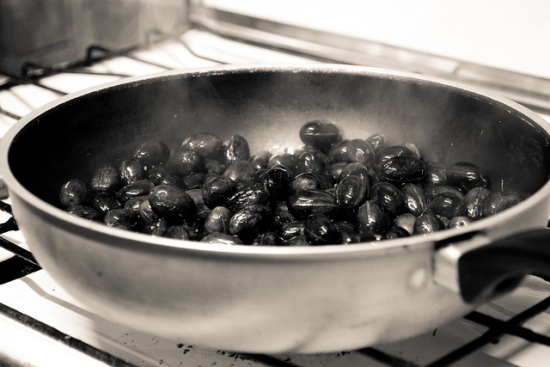
Preparation time: 25 minutes
Surrender for: 6 servings
Ingredients
- 3 beaten eggs
- 5 ounces soft cheese (the cheese of your choice)
- 1 and 1/2 cup breadcrumbs
- 20 ounces large pitted black olives
- 1/2 cup of milk
- Enough oil to fry the black olives
Procedure
- Use paper towels to thoroughly dry each olive.
- Fill each olive with cheese. You can do it with the help of a pastry bag or a thick plastic bag.
- Place the breadcrumbs in a small bowl and mix the milk and eggs.
- The olives should be dipped in the egg mixture and then rolled in breadcrumbs until completely covered.
- In a large pot fry the olives with enough oil. They will be ready when they are completely golden.
- Before serving, let them cool down a bit.
Quick Pasta Salad With Black Olives

Preparation time: 15 minutes
Surrender for: 12 servings
Ingredients
- 10 ounces of pasta (your choice)
- 3/4 sliced green bell pepper
- 1 pound finely chopped salami
- 3/4 sliced red bell pepper
- 8 ounces of black olives (sliced)
- 1 diced onion
- 1 cup of milk cream
- 10 ounces of mozzarella balls
- 1 cup grated of parmesan cheese
Procedure
- Bring a large pot of water to a boil with a little salt. Boil the pasta for 7 minutes or until soft to bite but still firm. Rinse with cold water.
- Mix the salami, peppers, onion, mozzarella balls, olives, and milk cream.
- In a large bowl, mix the pasta with the above dressing.
- Serve and add parmesan cheese just before serving.
Black Olives To Add
Delighted with the nutrients and benefits of black olives? Surely yes. They also have the advantage that you can eat them raw or cooked. So start adding them to many of the preparations you usually make. You will not regret its taste.

I am a professional health and nutrition writer with extensive experience in the industry. My passion for sharing valuable insights on nutrition and wellness stems from over 15 years of personal training and maintaining a healthy lifestyle. My commitment to continuously educate myself on the latest trends and research in the field allows me to deliver high-quality content that is informative and engaging. My mission is to empower individuals to make informed decisions about their health and well-being through my writing.
